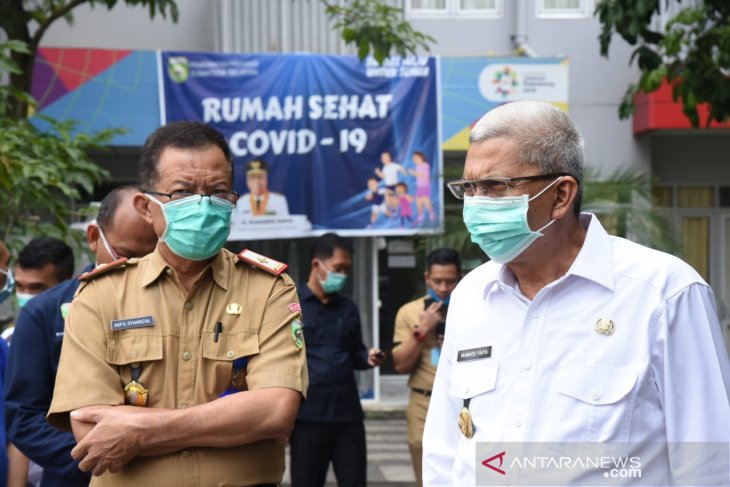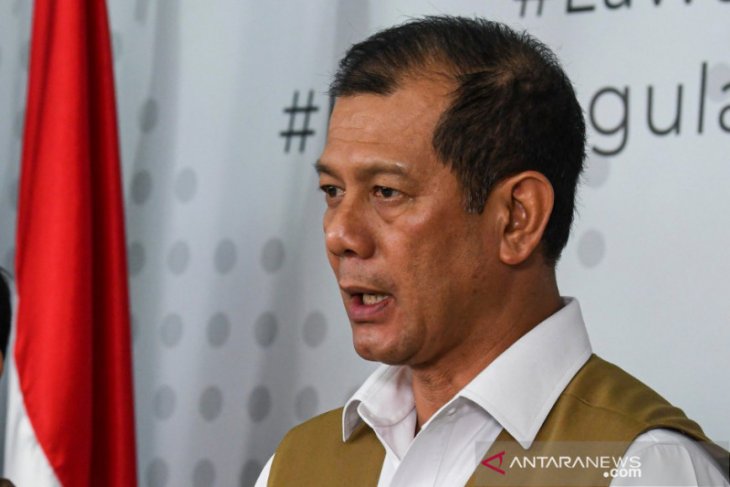Live Streaming
Program Highlight
Company Profile

Ani Hasanah
April

The Palembang ODP Center (Dok Humas Pemprov)
The Jakabaring Athletes' House (Wisma Atlet) in Palembang, currently functioning as South Sumatra Province's center for treatment of people with the COVID-19 monitoring status (ODP), has received eight Bangladeshi nationals and three Sri Lankans.
These foreign nationals were members of the Jamaah Tabligh, who were in Palembang, the capital of South Sumatra Province, to gain a broader understanding of Islam over these past three months, Head of the Jakabaring ODP Center Aufa Syahrizal informed journalists in Palembang, South Sumatra, Monday.
The foreign nationals told the local authorities that their respective governments' lockdown policies had hindered their return to the countries of origin, according to Syahrizal.
To prevent them from venturing outdoors for ensuring the safety of all, they were quarantined at the ODP Center, Syahrizal noted, adding that currently, the ODP Center had accommodated 34 people with ODP status.
Akin to several other big cities in Indonesia, the authorities in Palembang, South Sumatra, have also been battling the coronavirus pandemic, which originated in the Chinese city of Wuhan by the end of 2019 and since then spread to various countries across the world.
According to media reports, as of April 27, at least 2.99 million people had contracted the COVID-19 infection, while 206,992 of them succumbed to the disease, and 878,820 others fully recovered.
Indonesia recorded at least 8,882 confirmed cases, while death toll from the virus reached 743, and 1,107 patients were discharged from hospitals after fully recovering from coronavirus that had severely impacted the economies of so many countries.
On account of COVID-19 infections spreading to all 34 provinces in Indonesia, President Joko Widodo (Jokowi) had declared the coronavirus outbreak a national disaster. (ANTARA)
April

Photo File: Head of Indonesia's Task Force for the Acceleration of COVID-19 Response, Doni Monardo, delivered statements in Jakarta. ANTARA FOTO/
Indonesia's Task Force for the Acceleration of COVID-19 Response expects public activities to normalize in July after months of enacting large-scale social restrictions in some Indonesian provinces, the body's chief, Doni Monardo, stated in Jakarta, Monday.
"The President (Joko Widodo) prompts us to work harder while calling on people to comply with the rules and to become more vigilant and disciplined," Monardo noted during a video press conference in Jakarta.
Monardo, concurrently chairing the National Disaster Mitigation Agency (BNPB), also called on ministries and public offices as well as all stakeholders to become stricter in enforcing physical distancing and other rules imposed under the large-scale social restrictions.
"(By following all rules), we expect normalcy to be restored in our lives in July," he remarked.
Monardo also reiterated that Indonesia's government had banned people from following the homecoming or mudik tradition, with police officers blocking several thousand vehicles at some thoroughfares.
In order to prevent the Ramadhan exodus, Monardo expects public agencies to introduce the ban through a simple message. "It must be delivered through the use of simple words and local language, so the people are acclimatized to the fact that they are not allowed to follow the homecoming tradition and that they must follow physical distancing while also washing their hands regularly," Monardo expounded.
As of Sunday (April 26), Indonesia's Ministry of Health had confirmed 8,882 positive cases and 743 deaths. Of the total positive cases, 1,107 had recovered from the disease. (ANTARA)
April
![Southern Yemeni separatist security members patrol a street during a campaign to arrest unlicensed motorcycles in Aden [File: Fawaz Salman/Reuters]](https://www.aljazeera.com/mritems/imagecache/mbdxxlarge/mritems/Images/2020/4/26/bc9ec2945fb94b1194c6e16fa9c56c03_18.jpg) Southern Yemeni separatist security members patrol a street during a campaign to arrest unlicensed motorcycles in Aden [File: Fawaz Salman/Reuters]
Southern Yemeni separatist security members patrol a street during a campaign to arrest unlicensed motorcycles in Aden [File: Fawaz Salman/Reuters]
A Saudi Arabia-led military coalition has rejected a separatist group's declaration of self-rule in Yemen's south, demanding "an end to escalatory actions" and return to a peace deal signed in November last year.
The Saudi statement on Monday comes a day after Yemen's Southern Transitional Council (STC) declared a state of emergency and announced "self-administration rule" in regions under their control, including in the port city of Aden.
The key city serves as the interim capital of the internationally recognized and Saudi-backed government of President Abd-Rabbu Mansour Hadi.
The STC and Hadi's forces are supposed allies in Yemen's complicated conflict and both have fought together in the Saudi-led coalition's war against the Houthi rebels, who overran parts of northern Yemen in 2014, including the capital, Sanaa.
But the STC turned on Hadi's government in August last year and seized Aden. The fighting stopped when the two groups reached a deal in the Saudi capital, Riyadh.
In its statement on Monday, the Saudi-led coalition urged the council to return to the terms of the Riyadh agreement. That deal had called for all sides to remove heavy military equipment from Yemeni cities under their control and form a unity government that included equal representation.
But that had yet to be implemented as the war continued and enormous floods struck Aden, killing at least 21 people earlier this month. Compounding the troubles, Yemen on April 10 announced its first case of the COVID-19.
The Saudi-led coalition said it "demands an end to any escalatory actions and calls for a return to the agreement by the participating parties".
The deal "entails forming a competent government that operates from the interim capital Aden to tackle economic and developmental challenges, in light of natural disasters such as floods, fears of the COVID-19 pandemic outbreak, and work to provide services to the brotherly people of Yemen". (Al Jazeera)


